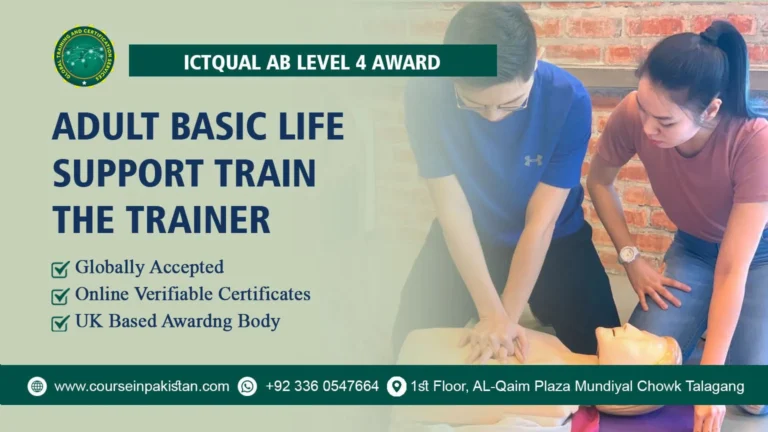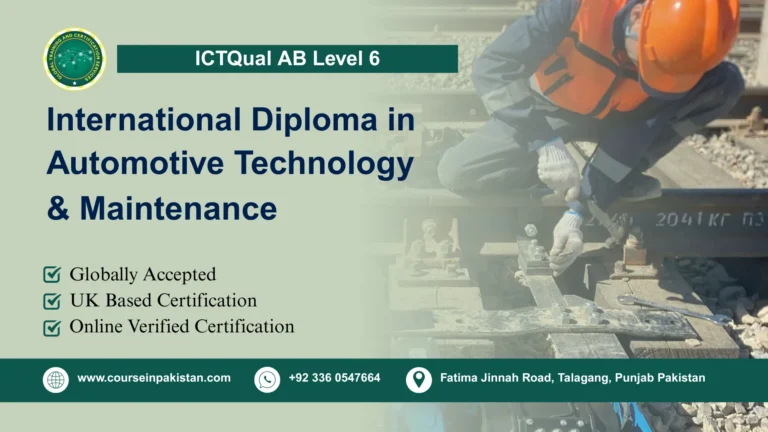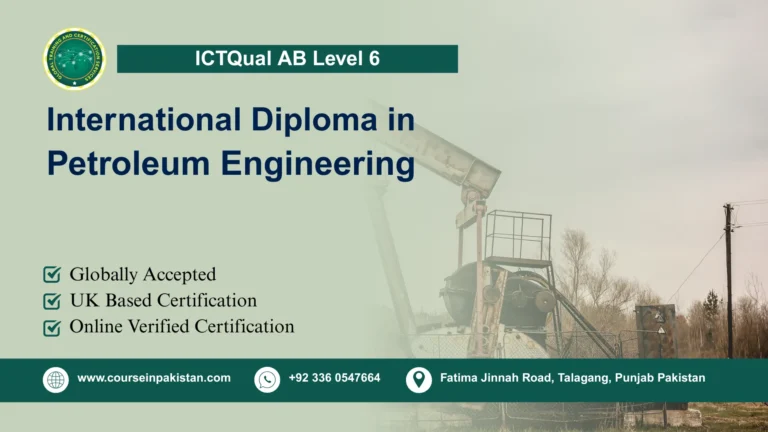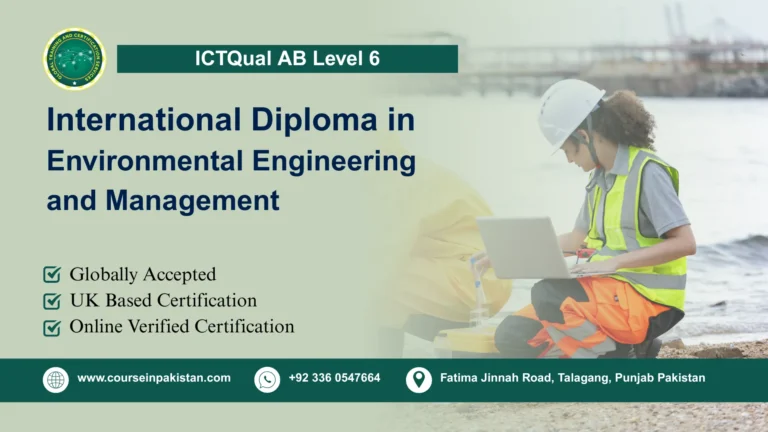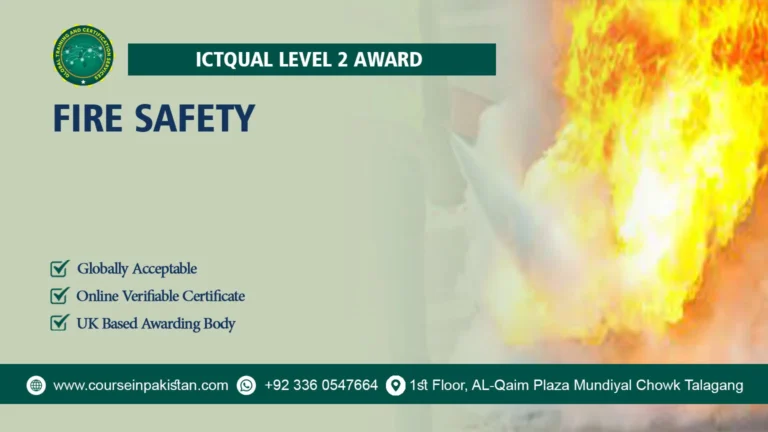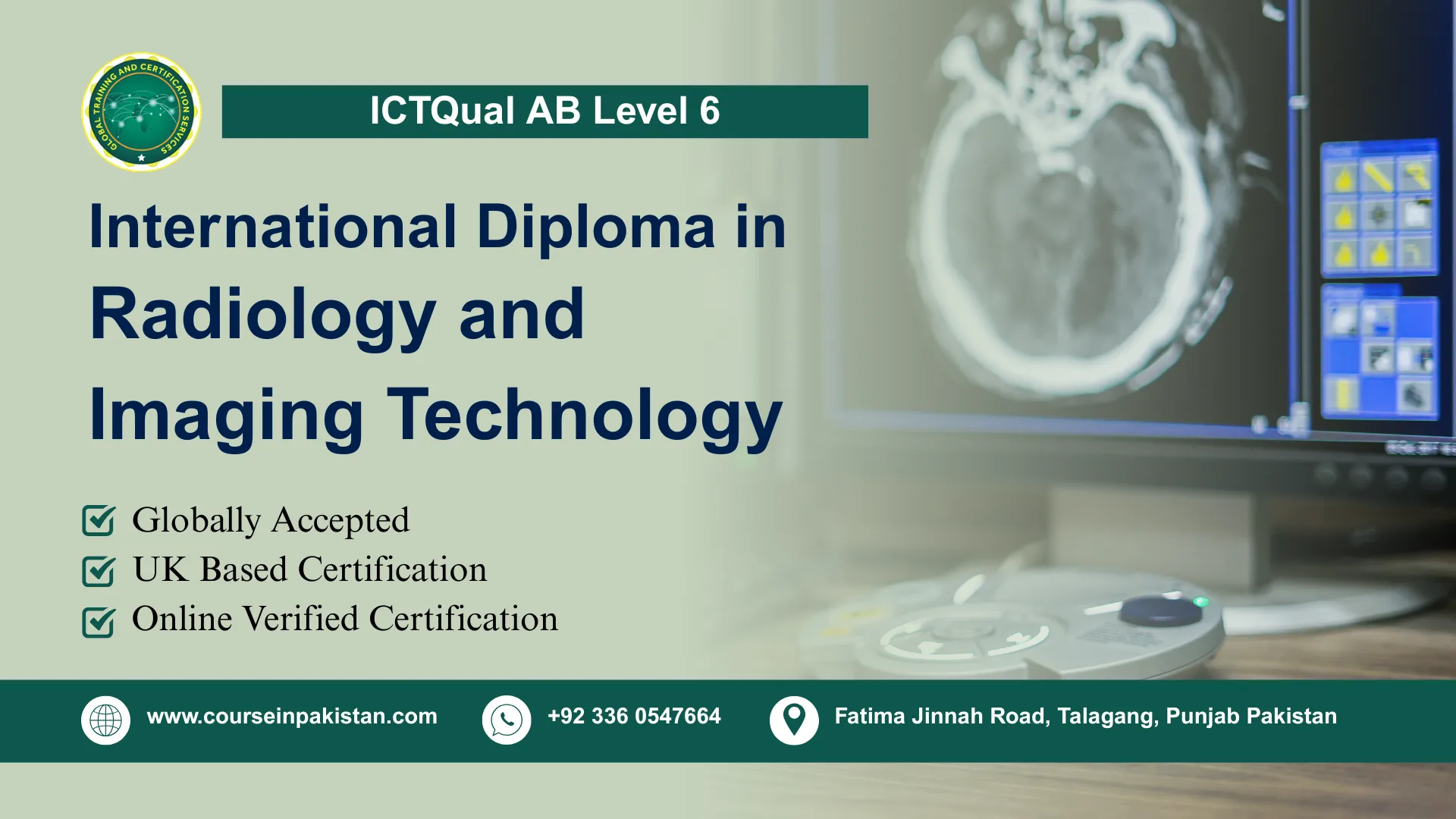
The ICTQual AB Level 6 International Diploma in Radiology and Imaging Technology is a comprehensive, advanced-level qualification designed for individuals who aspire to excel in the field of medical imaging and radiology. This internationally recognized diploma equips learners with the essential theoretical knowledge and practical skills needed to perform imaging procedures safely, accurately, and efficiently. Whether you are a fresh graduate or a healthcare professional seeking to enhance your expertise, this program provides flexible learning opportunities to study at your own pace from anywhere in the world.
This qualification is British Council verifiable, MOFA and Embassy attestable, ensuring global recognition and credibility. It is ideal for professionals aiming to pursue a rewarding career in hospitals, diagnostic centers, and private clinics. The curriculum emphasizes both the technical and clinical aspects of radiology, including advanced imaging modalities, patient care, safety protocols, and emerging technologies in medical imaging. By the end of this program, learners will be well-prepared for high-demand roles in healthcare, improving patient outcomes while advancing their own professional growth.
Course Overview
The ICTQual AB Level 6 International Diploma in Public Health and Epidemiology is a 360-credit, fully assignment-based qualification that allows learners to study at their own pace from anywhere in the world. This internationally recognized certification is British Council verifiable, MOFA and Embassy attestable, making it highly suitable for job opportunities and Iqama approval. The program is designed to equip learners with advanced knowledge and practical skills in epidemiology, public health research, disease prevention, health policy, and community health interventions.
Fresh students are required to complete all 36 mandatory assignments within three years, gaining comprehensive understanding and practical expertise in public health principles, statistical analysis, epidemiological methods, and health program implementation. Experienced professionals can pursue this certification by submitting verifiable six years of relevant experience and demonstrating their knowledge through professional discussion meetings with an ICTQual AB approved assessor, enabling them to achieve the qualification in a shorter period without completing all assignments. This flexible approach ensures accessibility for learners at all stages while providing an internationally recognized credential that enhances career prospects, professional credibility, and opportunities in public health and epidemiology globally.
Key Highlights of the Course:
- Comprehensive Level 6 diploma focused on Radiology and Imaging Technology
- Fully assignment-based, allowing self-paced learning from anywhere in the world
- British Council verifiable and MOFA/Embassy attestable for global recognition
- Covers advanced imaging techniques, radiological safety, and patient care
- Suitable for fresh graduates and experienced healthcare professionals
Course Benefits
Career Advancement
- Enhances employability in hospitals, diagnostic centers, and imaging clinics
- Prepares learners for managerial and senior technical roles in radiology
Global Recognition
- British Council verifiable, MOFA and Embassy attestable certification
- Recognized internationally, supporting professional mobility
Practical & Theoretical Expertise
- In-depth knowledge of radiology equipment, imaging techniques, and protocols
- Focus on patient safety, quality control, and modern diagnostic methods
Flexible Learning
- Self-paced assignments suitable for working professionals or students
- Accessible from anywhere in the world, with no strict classroom requirements
Professional Growth
- Builds confidence and competence for advanced clinical roles
- Supports continuous learning and specialization in medical imaging
Course Study Units
This qualification, the ICTQual AB Level 6 International Diploma in Radiology & Imaging Technology 360 Credits – Three Years, consists of 36 mandatory units.
Year 1: Foundation in Radiology & Imaging Technology
- Introduction to Radiology and Imaging Sciences
- Human Anatomy and Physiology for Imaging
- Principles of Physics in Medical Imaging
- Fundamentals of Radiographic Techniques
- Radiation Safety and Protection
- Introduction to Medical Imaging Modalities
- Patient Care and Communication Skills
- Basic Medical Terminology
- Laboratory Safety and Quality Assurance
- Introduction to Imaging Equipment Operation
- Medical Ethics and Professional Conduct
- Research Methods in Healthcare
Year 2: Intermediate Radiology Applications
- Advanced Radiographic Techniques
- Computed Tomography (CT) Imaging
- Magnetic Resonance Imaging (MRI) Principles
- Ultrasound Imaging Fundamentals
- Nuclear Medicine and Radiopharmacy Basics
- Clinical Radiology and Diagnostic Interpretation
- Imaging Informatics and Digital Systems
- Health and Safety in Imaging Departments
- Patient Assessment and Care in Imaging
- Quality Control and Equipment Maintenance
- Applied Research Methods in Imaging
- Leadership and Teamwork in Radiology Practice
Year 3: Advanced Specialisation and Professional Practice
- Advanced MRI and CT Imaging Techniques
- Interventional Radiology Procedures
- Advanced Ultrasound Applications
- Imaging in Oncology and Cardiology
- Radiology Reporting and Interpretation Skills
- Advanced Radiation Protection Practices
- Biomedical Imaging Technology Integration
- Emerging Trends in Radiology and Imaging
- Clinical Placement / Practical Competency
- Capstone Project / Dissertation in Radiology
- Professional Practice and Reflective Development
- Healthcare Management and Policy in Imaging
Learning Outcomes
Year 1: Foundation in Radiology & Imaging Technology
Introduction to Radiology and Imaging Sciences
- Demonstrate an understanding of the history, scope, and roles of radiology in healthcare
- Identify different imaging modalities and their clinical applications
Human Anatomy and Physiology for Imaging
- Explain human anatomy and physiological processes relevant to imaging
- Apply anatomical knowledge to identify structures in radiographic images
Principles of Physics in Medical Imaging
- Describe fundamental physical principles underlying medical imaging techniques
- Analyze the interaction of radiation with matter in diagnostic imaging
Fundamentals of Radiographic Techniques
- Demonstrate proper positioning and exposure techniques for standard radiographs
- Apply basic radiographic procedures safely and accurately
Radiation Safety and Protection
- Identify radiation hazards and implement safety measures
- Apply regulatory and professional guidelines for radiation protection
Introduction to Medical Imaging Modalities
- Compare different imaging modalities and their clinical indications
- Understand the advantages and limitations of each modality
Patient Care and Communication Skills
- Demonstrate effective communication with patients during imaging procedures
- Apply principles of patient-centered care in radiology practice
Basic Medical Terminology
- Use medical terminology accurately in radiology documentation and communication
- Interpret common radiology abbreviations and terms
Laboratory Safety and Quality Assurance
- Implement laboratory safety protocols and quality assurance procedures
- Recognize the importance of maintaining a safe and compliant imaging environment
Introduction to Imaging Equipment Operation
- Demonstrate basic operation and handling of radiology equipment
- Identify essential components and functions of imaging devices
Medical Ethics and Professional Conduct
- Apply ethical principles and professional standards in radiology practice
- Recognize and address ethical dilemmas in healthcare imaging
Research Methods in Healthcare
- Explain fundamental research methodologies in healthcare
- Critically evaluate research literature relevant to radiology
Year 2: Intermediate Radiology Applications
Advanced Radiographic Techniques
- Apply advanced positioning and imaging techniques for specialized examinations
- Evaluate radiographic quality and optimize imaging parameters
Computed Tomography (CT) Imaging
- Demonstrate understanding of CT principles and operation
- Interpret CT images for diagnostic purposes
Magnetic Resonance Imaging (MRI) Principles
- Explain the principles of MRI and safety considerations
- Evaluate MRI images and understand pulse sequences
Ultrasound Imaging Fundamentals
- Operate basic ultrasound equipment and perform standard scans
- Identify normal and pathological findings in ultrasound images
Nuclear Medicine and Radiopharmacy Basics
- Explain the principles of nuclear medicine imaging and radiopharmaceutical use
- Demonstrate understanding of patient safety and radiation protection in nuclear imaging
Clinical Radiology and Diagnostic Interpretation
- Interpret radiographs, CT, and MRI images for diagnostic decision-making
- Recognize common pathological findings in clinical imaging
Imaging Informatics and Digital Systems
- Utilize digital imaging systems and PACS (Picture Archiving and Communication Systems)
- Apply informatics tools for image storage, retrieval, and reporting
Health and Safety in Imaging Departments
- Implement departmental safety procedures and emergency protocols
- Identify hazards specific to imaging environments and mitigate risks
Patient Assessment and Care in Imaging
- Conduct patient assessments prior to imaging procedures
- Demonstrate patient care techniques, including managing vulnerable populations
Quality Control and Equipment Maintenance
- Perform routine quality control checks on imaging equipment
- Apply preventative maintenance practices to ensure optimal performance
Applied Research Methods in Imaging
- Conduct small-scale research projects in radiology
- Analyze and present findings using appropriate statistical methods
Leadership and Teamwork in Radiology Practice
- Demonstrate effective teamwork and leadership in clinical settings
- Apply professional communication and conflict resolution skills
Year 3: Advanced Specialisation and Professional Practice
Advanced MRI and CT Imaging Techniques
- Perform and optimize advanced MRI and CT procedures
- Evaluate image quality for complex diagnostic cases
Interventional Radiology Procedures
- Demonstrate understanding of interventional radiology techniques and safety
- Assist or perform supervised interventional procedures
Advanced Ultrasound Applications
- Conduct specialized ultrasound scans for specific clinical applications
- Interpret advanced ultrasound findings accurately
Imaging in Oncology and Cardiology
- Apply imaging techniques for oncology and cardiac assessments
- Identify common pathologies in oncology and cardiology imaging
Radiology Reporting and Interpretation Skills
- Produce accurate and professional radiology reports
- Interpret imaging studies critically to support clinical decisions
Advanced Radiation Protection Practices
- Implement advanced radiation protection measures for patients and staff
- Apply dose optimization strategies in complex imaging procedures
Biomedical Imaging Technology Integration
- Integrate knowledge of multiple imaging modalities for clinical problem-solving
- Evaluate the use of emerging imaging technologies in patient care
Emerging Trends in Radiology and Imaging
- Identify current and emerging trends in radiology practice and technology
- Evaluate the impact of technological advancements on imaging services
Clinical Placement / Practical Competency
- Demonstrate competence in clinical radiology practice under supervision
- Apply learned skills in real-world imaging scenarios
Capstone Project / Dissertation in Radiology
- Conduct independent research addressing a significant radiology problem
- Present findings in a professional report or dissertation format
Professional Practice and Reflective Development
- Reflect on personal and professional growth during the program
- Demonstrate lifelong learning strategies for continuous improvement
Healthcare Management and Policy in Imaging
- Understand healthcare policies and management practices affecting imaging services
- Apply management principles to improve departmental efficiency and patient care
Who is This Course For?
The ideal learner for this course is someone who is motivated to develop advanced skills in radiology and imaging technology and seeks a professional career in healthcare. This includes:
- Aspiring Radiology Professionals: Individuals aiming to begin a career in medical imaging or radiology departments.
- Healthcare Practitioners: Nurses, medical technicians, or allied health professionals seeking to specialize in imaging.
- Lifelong Learners: Those interested in continuous professional development and upskilling in advanced diagnostic imaging.
- Self-Paced Learners: Individuals looking for flexible, assignment-based learning that can be completed from anywhere in the world.
- Career-Oriented Graduates: Fresh graduates in medical sciences seeking a globally recognized, British Council verifiable qualification for career advancement.
Future Progression
Completion of ICTQual AB Level 6 International Diploma in Radiology and Imaging Technology can open up multiple pathways for professional growth:
- Senior Radiographer or Imaging Specialist: Advanced clinical roles in hospitals, diagnostic centers, or private clinics.
- Medical Imaging Technologist Leadership: Opportunities in departmental management, supervision, and team leadership.
- Further Academic Study: Progression to postgraduate studies in Radiology, Medical Imaging, or related healthcare disciplines.
- Healthcare Research and Consultancy: Engagement in research projects, clinical trials, or advisory roles in imaging technology.
- Global Career Opportunities: Eligibility to work in internationally recognized healthcare settings due to MOFA/Embassy attestable certification.
Academic Pathways:
- The qualification provides multiple academic pathways:
- Postgraduate Studies: Enroll in MSc or PGDip programs in Radiology and Imaging Technology.
- Specialized Certifications: Pursue certifications in MRI, CT, Ultrasound, or Interventional Radiology.
- Healthcare Leadership Programs: Advance to management and administrative roles in healthcare institutions.
- Research and Innovation: Access pathways to research-based programs and professional development in biomedical imaging.
Conclusion
The ICTQual AB Level 6 International Diploma in Radiology & Imaging Technology is a robust, internationally recognized program designed to equip learners with advanced knowledge, practical skills, and professional competence in medical imaging. It provides flexible, assignment-based learning that is verifiable and globally attested, making it ideal for both fresh graduates and experienced healthcare professionals. Completing this diploma not only enhances employability in diagnostic and clinical settings but also lays the foundation for academic progression, leadership roles, and a dynamic career in the evolving field of radiology and imaging technology.

